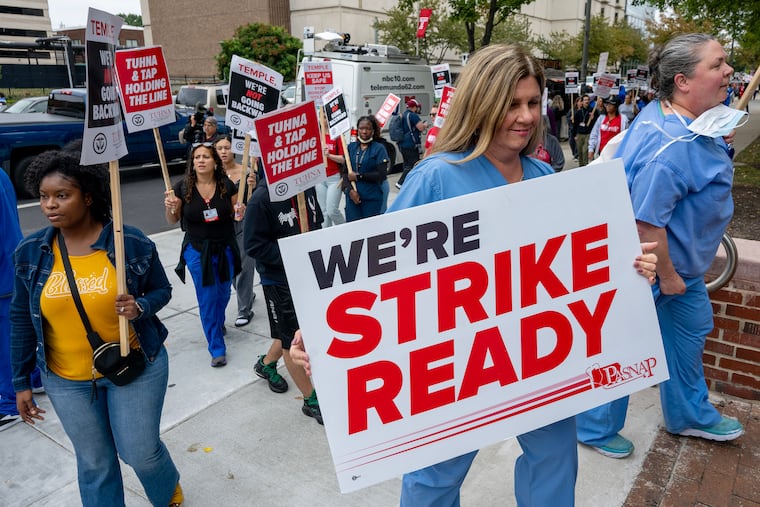Temple nurses plan to strike on October 6 if contract negotiations are unsuccessful.
Nurses and technicians at Temple Health have indicated plans to initiate a strike on October 6 if a contract agreement is not reached with the healthcare system, as announced by their union. The strike notice, mandated by federal law, follows a vote by members of the Pennsylvania Association of Staff Nurses and Allied Professionals (PASNAP), which took place last Friday, authorizing the potential walkout.
PASNAP represents approximately 1,600 nurses and 1,000 additional medical professionals employed by Temple Health, with current contracts set to expire on September 30. The potential strike would impact nurses and technicians at both Temple University Hospital and Temple Women and Families Hospital, including those working in the bone marrow transplant unit at the Temple University Hospital-Jeanes Campus.
In response to the strike notification, officials with Temple Health expressed disappointment, yet stated they were not surprised. A spokesperson indicated that contingency plans have already incurred costs exceeding million, with an additional million anticipated next week for temporary staffing solutions during a potential strike. These funds, the spokesperson noted, diverted resources that could have otherwise benefitted employees or improved equipment procurement.
Temple Health remains committed to continuing negotiations, aiming to avoid a work stoppage that could prolong the contract resolution process. Safety concerns have been a central theme in the ongoing negotiations, as union leaders emphasize the need for improved workplace conditions. Reports from nurses highlight frequent incidents of workplace violence, raising alarms about staff and patient safety.
The previous contract negotiated in 2022 included measures to enhance safety protocols, such as debriefings after violent episodes, yet union representatives assert that more robust actions must be taken to protect workers. The union proposes expediting debriefing processes and enhancing security measures, particularly in light of troubling incidents reported in recent months, including a man barricading himself within the hospital’s emergency department.
Nurses have also voiced concerns over the proposed reductions in benefits and costs associated with accessing healthcare outside Temple’s system. Furthermore, the union criticizes recent financial investments, such as Temple’s acquisition of the Redeemer Health share in Chestnut Hill Hospital, which they argue diverts focus away from addressing pressing staff needs amidst looming federal budget cuts.
The impending strike at Temple Health is not an isolated incident; it reflects a broader trend among healthcare unions in Philadelphia, where contract negotiations have frequently led to strike threats. In 2023, nurses at Lower Bucks Hospital and Suburban Community Hospital previously engaged in a five-day strike, although they ultimately returned to work without a finalized agreement.
The call to strike at Temple illustrates ongoing tensions in the healthcare sector, particularly regarding worker safety, staffing challenges, and contract negotiations. As critical decisions loom, both union officials and Temple Health are urged to prioritize a resolution that addresses the concerns raised by healthcare staff while maintaining patient care standards.







